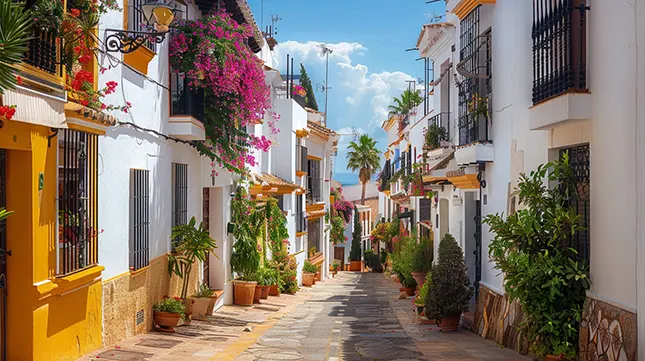Spain Retirement Visa – How to Apply & Relocate

Have you ever wondered what it would be like to retire abroad and need some information about Spain retirement visa?
You are not alone hundreds of thousands have gone before you.
Here is our Spain Retirement Visa – How to Apply & Relocate we outline how to go about it.
Spain’s blend of favourable climate, affordability, quality of life, healthcare options, and cultural richness makes it an attractive destination for retirees seeking to enjoy their golden years in a beautiful and welcoming environment.
One of the other benefits of living in Spain is that it is close enough for family and friends to visit you regularly. No need to feel too homesick!
Sadly, it is not as simple as it once was.
Moving to Spain from the UK requires careful preparation, particularly in the aftermath of Brexit.
With the proper planning, it is possible, and it can be an incredibly rewarding and enjoyable experience.
Here’s an overview of the process, key considerations, and tips for making your move to Spain smoother.
Remember to stay flexible and open-minded, as adapting to a new country may have its challenges.
For most of us, change can be tough, but it also offers countless rewards.
Types of Retirement Visas

You will need to apply for a visa before retiring in Spain.
So, before enjoying all the wonderful benefits a Spanish retirement offers, you will need to apply for a visa.
The application process must start in your home country or the country where you currently live, not in Spain.
UK citizens can stay in Spain for 90 days.
For stays longer than 90 days, you must have the correct visa – meaning if you are looking to retire here you will need to arrange this ahead of time.
Luckily, there is not one specific retirement visa you will have to select, there are in fact several options to choose from that we will explore in more detail now.
Non-Lucrative Visa
This is the most common visa for retirees because it allows you to stay, but it is illegal to undertake any form of employment or professional activity.
It is suitable for those who can financially support themselves through pensions, savings, or investments.
Applicants must have proof of sufficient financial means to cover their living expenses without working in Spain.
The visa is initially granted for one year. After this period, it can be renewed for two-year periods at a time.
After five years, it’s possible to apply for permanent residency which is certainly a great option for many retirees from the UK and is well worth considering if you are eligible to apply.
Requirements for a Non-Lucrative Visa
To apply for a non-lucrative visa, you must prove that you have sufficient financial resources to support yourself during your stay.
The requirements for approval are:
- Proof of sufficient funds to support you while you reside in the country. Copies of bank statements, pension statements, etc. will be required.
- Applicants must have a clean criminal record in Spain and the countries where they have resided during the last five years. Proof is also required.
- You must also not have been banned entry to the Schengen Territory in the past or present.
- Not to be irregularly in Spanish Soil.
- Proof that you have private health insurance. This insurance must offer full coverage without co-payments, ensuring access to healthcare during your stay.
- Your passport must be valid for at least one year and have at least two blank pages.
- Finally, you need to show proof of accommodation in Spain for at least the first three months, such as a rental contract or property deed
There is a much more in-depth explanation of these requirements on MS Residency.
Golden Visa
This visa is ideal for those who can invest significantly in Spain, such as purchasing real estate worth at least €500,000 (£423,000).
It provides a quicker path to residency and the flexibility to work if desired.
The Golden Visa offers a straightforward residency process, allowing family members to accompany you.
Investors can also benefit from Spain’s favourable tax regime for new residents.
In short, the Golden Visa program gives individuals renewable temporary residence permits in exchange for investing in the country.
Eligibility for Golden Visa
To help make understanding the Golden Visa application process a little easier we have put together a list of the documents you must provide to demonstrate your eligibility.
The process is similar to that of a non-lucrative visa application. These documents must be submitted to your home country’s Spanish consulate or embassy.
- Valid Passport: Your passport must be valid for at least one year and have at least two blank pages for the visa stamp.
- Visa Application Form: A completed and signed visa application form.
- Photographs: Passport-sized photographs (usually two) meet the specifications required by the Spanish consulate.
- Proof of Investment: Documentation proving that you have made the required investment in Spain. For real estate, this would include the property deed and a certificate from the Land Registry showing ownership and investment amount (minimum €500,000).
- Financial Means: Evidence that you have sufficient financial means to support yourself and any family members during your stay in Spain. This can include bank statements, income statements, and other financial documents.
- Health Insurance: Proof of having health insurance that covers you in Spain. The insurance must be from a provider authorised to operate in Spain.
- Criminal Record Certificate: A criminal record check from your home country, issued within the last three months, translated into Spanish and apostilled.
- Medical Certificate: A medical certificate issued by a competent authority confirming that you do not have any illnesses that could threaten public health, translated into Spanish and apostilled.
- Proof of Accommodation: Evidence of where you will live in Spain, such as a rental contract or proof of property ownership.
- Proof of Relationship: If applying with family members, you need to provide proof of relationship (e.g., marriage certificate, birth certificates), translated into Spanish and apostilled.
- Application Fee Payment Receipt: Proof that you have paid the visa application fee.
Application Process and Submission
To submit your application in person at the Spanish consulate or embassy in your home country, you will need to make an appointment well in advance.
Spain is a very popular destination, so be sure to plan this ahead of time to avoid any delays to your move!
Biometric data will be collected during your consulate appointment.
Once your application is approved, you will receive a visa valid for 90 days.
Upon arrival in Spain, you must apply for a Foreigner Identity Card (TIE) within the first month.
Find out how to apply for a TIE and the documentation you will need to support the application.
This card is initially valid for one year and can be renewed.
The renewal process is straightforward, provided you meet financial and health insurance requirements.
After five years of continuous residency, you can apply for permanent residency, which comes with additional benefits such as the ability to work and access to social security.
Will I Pay Tax when I retire to Spain?

You will need to get a good understanding of taxes in Spain.
You automatically become a tax resident if you spend 183 days or more per year in Spain.
This means you’ll need to pay income tax on your worldwide income, which includes pensions from your home country.
Understanding how your pension will be taxed in Spain is crucial for financial planning.
Even if you’re not a full-time resident, owning property in Spain requires you to pay certain taxes, such as municipal and rental income taxes.
These obligations apply regardless of how much time you spend in Spain.
Navigating international tax laws can be complex, so it’s wise to seek advice from a tax advisor or accountant specialising in cross-border taxation.
Ensure they understand the specific tax laws and treaties between your home country and Spain; ideally, they should speak English to ensure clear communication.
For detailed information, resources like Financial Planning Spain provide comprehensive guides on the Spanish taxation system, which can be very helpful for retirees.
Proper financial planning can help you maximise the benefits of living in this beautiful country without unexpected tax surprises.
Where are you Going to Spend Your Retirement in Spain?

Marbella, Malaga.
Deciding where to retire in Spain is a highly personal choice, as everyone has different criteria and dreams for their ideal retirement.
Arguably, this is the most crucial decision for those relocating in the long term.
Some might choose to be close to the family already living in Spain, while others might be drawn to the country’s stunning coastlines or the tranquillity of the countryside.
If you dream of waking up to the sound of waves, Spain’s beautiful seaside towns could be perfect for you.
Places like Costa del Sol and Costa Blanca offer sunny weather, beautiful beaches, and vibrant expat communities.
These areas are popular for their laid-back lifestyle and excellent amenities tailored for retirees.
Regions like Andalusia or Catalonia’s countryside offer picturesque landscapes, rich history, and a slower pace of life for those who want to live in a traditional finca (farmhouse) surrounded by nature.
These areas are ideal for enjoying peaceful rural living with the added charm of Spanish culture.
If you crave a cultural hub with plenty to see and do, consider cities like Madrid, Barcelona, or Valencia. They offer a dynamic lifestyle with a mix of modern conveniences and historical charm.
Spain truly has something for everyone, from bustling cities to quiet villages, mountain retreats, and beachside paradises.
Choosing your Ideal Retirement Spot
Once you have decided on the region that best suits you in Spain, it is time to narrow down and pinpoint your ideal location.
Here are some of the many places in Spain considered popular with retirees.
Fuengirola: Located on the Costa del Sol in Malaga, Fuengirola is a favourite among British retirees. With stunning beaches and a bustling nightlife, it offers year-round sunshine and a close-knit community. It’s perfect for those who enjoy a lively atmosphere and beachside living.
Benidorm: This coastal town on the Costa Blanca is known for its beautiful beaches and relaxed lifestyle. The area boasts picturesque villages and an enviable climate, making it a top choice for those seeking a blend of comfort and natural beauty.
Valencia: This city offers an excellent alternative to coastal living with its rich history, stunning architecture, and vibrant culture. Valencia combines the charm of traditional Spanish culture with exceptional amenities in the southern region of Andalusia.
Mallorca: The largest of the Balearic Islands, Mallorca features a diverse landscape of beaches, mountains, and charming villages. Popular towns like Palma de Mallorca, Soller, and Porto Pollensa provide a tranquil yet cosmopolitan lifestyle, ideal for those seeking relaxation and excitement.
Extremadura: Known for its low cost of living, Extremadura is an excellent choice for budget-conscious retirees. Cities like Badajoz and Cáceres provide affordable housing and lower everyday expenses, making it easier to stretch your retirement savings.
Marbella: Also on the Costa del Sol, up-market Marbella is renowned for its luxury lifestyle, excellent golf courses, and designer shopping. It’s a popular choice for those who want to enjoy a bit of glamour in their retirement years.
Alicante: Situated on the Costa Blanca, Alicante offers a beautiful coastline, a mild climate, and a bustling city atmosphere. It’s known for its friendly expat community and excellent healthcare facilities.
Granada: Nestled at the foot of the Sierra Nevada mountains, Granada is perfect for those who appreciate history and culture. The city is famous for the Alhambra Palace and its quirky arts scene, providing a rich cultural experience.
Embrace the Challenge and Make New Friends

Spain is the perfect place to make some new friends,
Making friends as quickly as possible is another vital component of your long-term retirement in Spain.
Spain’s extensive expat communities make it easy to find like-minded individuals who share your interests and outlook on life.
Connecting with other expats can be invaluable as you settle into your new home.
Their insights and experiences will provide a wealth of information and help you navigate the local culture and community.
Forming friendships with fellow expats can make the transition easier, offering a support network and a sense of belonging.
Most retirees who have moved to Spain will tell you it was one of the best decisions they ever made.
Spain’s warm climate, engaging culture, and relaxed lifestyle combine to create an ideal environment for a fulfilling retirement and a multitude of opportunities to seek and find new friends.
Who knows, moving to Spain could genuinely transform your life!
Time to Make the Move!

White & Company Truck
Embarking on your retirement journey to Spain is an exciting adventure, and there is no time like the present to make it happen.
Proper preparation is key to ensuring a smooth transition and thoroughly enjoying your new life in this beautiful country.
If you’re ready to take the plunge, White & Company can assist with all aspects of your move.
We offer comprehensive removal services to mainland Spain and its outlying islands, tailored to meet your specific needs.
Our services include full-load consignments for direct transport from point A to B and part-load consignments delivered shortly after your arrival.
We also provide storage solutions accredited to European standards, should you want to rent for a time and send for your belongings at a later date.
Booking your move with White & Company means we handle every detail, from packing your belongings in the UK to delivering them safely to your new home in Spain.
Our experienced teams are here to ensure your move is as effortless and uncomplicated as possible.
For more information on our services or to discuss your move, give us a call at 01489 663018.
Alternatively, you can fill out a quick quote form on our website, and a member of our team will get in touch with you promptly.
Let White & Company help you start your new chapter in Spain with ease and confidence.

Max is a seasoned writer and blogger in the real estate and home moving sectors, as well as a knowledgeable source of information for expatriates living and working abroad. His detailed insights have helped thousands of people move and live abroad with greater simplicity and ease.
Posted in: News
Leave a Comment (0) ↓


